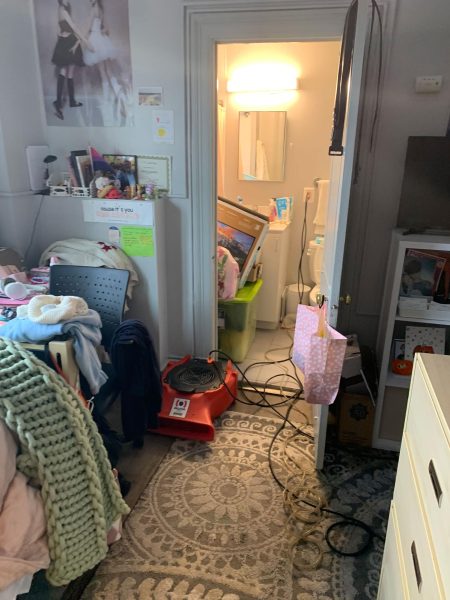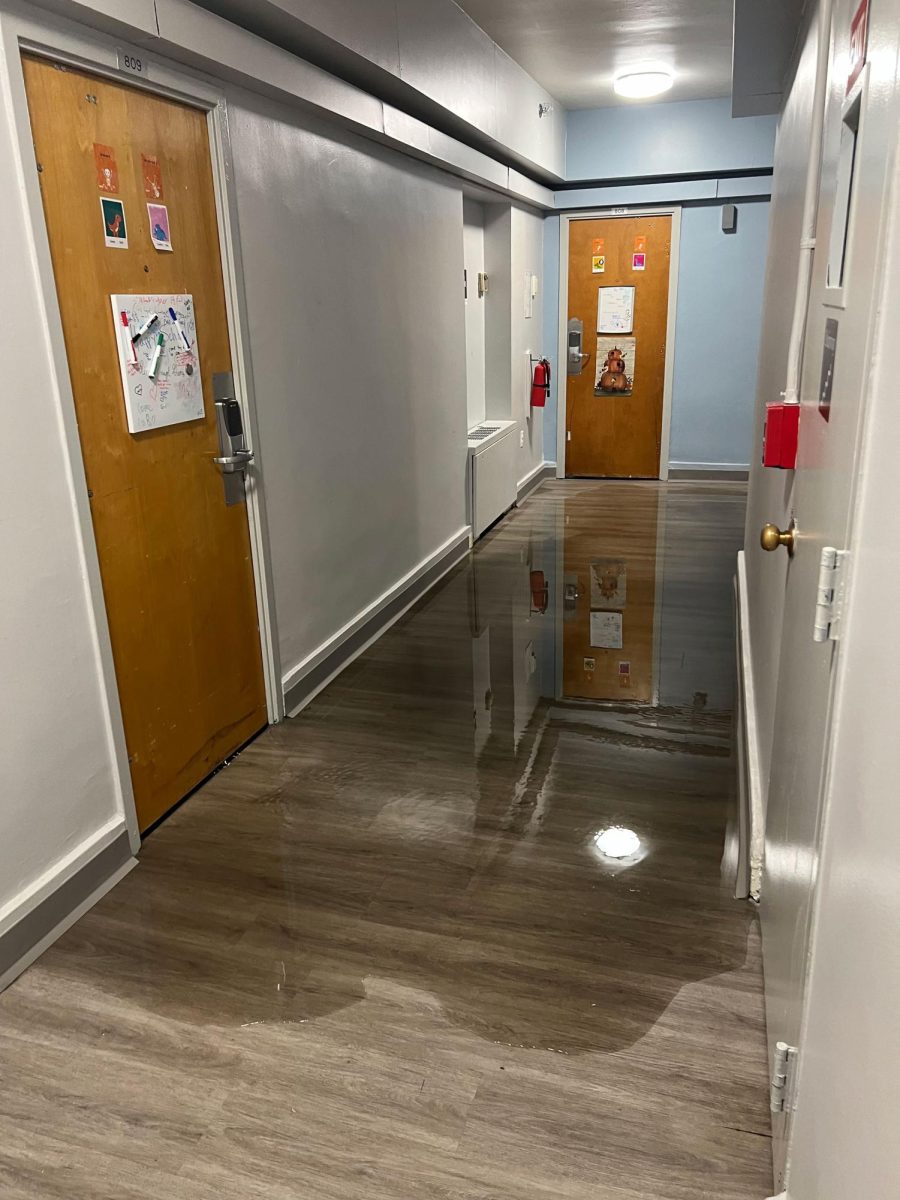Sophomore Isabella Insignares said she and her roommate suspected there was a leak in the ceiling of their eighth-floor FSK Hall room in late September after noticing bubbling paint and wetness on their bathroom and closet floor. A month later, repairs to fix the leak caused flooding that forced the students to evacuate their room and sleep in different nearby hotels for five consecutive nights.
Insignares said she and her roommate, sophomore Emme Seeley, called FixIt on Sept. 28 after noticing the dampness in their room, but when facilities workers checked the room that day, they said there was no ceiling leak and refused to make repairs. Insignares said a few days later, facilities workers returned and acknowledged the leak but said they needed to wait until the space dried to repair it.
Two weeks later, Insignares and Seeley still observed wet paint and damp floors. Insignares said maintenance workers came in on Oct. 30, directing them to clear their possessions from the closet because they would be checking on their request again and repainting.
The day after, ceiling repairs on FSK’s eighth floor accidentally triggered the building’s sprinklers, damaging walls and ceilings, according to University spokesperson Julia Metjian. More than two dozen students, including Insignares and Seeley, said they waited nearly five hours to reenter FSK after officials evacuated students from the building to the University Student Center on Oct. 31 after the sprinklers’ activation.
“We were like, ‘Oh my god,’” Insignares said. “I was like, ‘This is not how I want my day to go.’”
The sprinkler activation led to flooding that caused more than two dozen students to report out-of-order elevators and damaged walls, hallways and staircases still undergoing repairs, along with damaged personal belongings. Four students said GW sent them to stay in nearby hotels the week of the flooding while facilities workers repaired water damage in their rooms.
Metjian said “trusted remediation vendors” are managing repairs, including patching and painting damaged walls and ceilings and that all work aside from elevator repairs is now complete.
Students said FSK’s two elevators broke after the sprinklers went off. KC Costanzo, a GW Facilities customer engagement and service enhancement associate, has updated FSK residents on pending repairs, informing residents in a Thursday email that one of the two elevators is up and running again and that fans and dehumidifiers have been removed from most rooms.
Metjian declined to say how many rooms were affected by flooding and how much the damages cost.
Insignares said officials moved her and Seeley to the Courtyard Marriott on 20th Street for five nights and relocated them to Yours Truly on New Hampshire Avenue for an additional night when the Courtyard Marriott was fully booked.
Insignares said she and Seeley had to check out and recheck into the Courtyard Marriott multiple times because officials didn’t tell them whether the two would stay in a hotel another night until after checkout time. Insignares requested to stay in a hotel for an additional night because her room had wet paint and dust from repairs, she said.
Insignares said the University covered the cost of the hotel stays, but she had to put a card down at the hotel for a $100 hold for incidental charges, which still hasn’t been lifted, putting her in a state of “financial limbo.”
“There have been times where it felt like pulling teeth like just trying to get information,” Insignares said. “Like them trying to get us to move back in early and cut the corners and cut the costs as much as they can.”
Insignares, who uses the dining halls on campus, said she requested funds for meals because Yours Truly is more than a 10-minute walk from the dining halls. She also requested reimbursement for an Uber ride back to the hotel after a late-night University Singers practice because she didn’t feel safe or comfortable walking back to an off-campus location at night. Officials denied both requests, she said.
Insignares said she was awarded $20 of laundry credit, which felt like a “slap in the face” because of the lack of communication about moving in and out of hotels.
“It very much feels like they saw us as an annoyance or a burden,” Insignares said. “And they were just going to do the minimum that they could to handle it.”
Shortly after officials allowed students to reenter their rooms following the Oct. 31 sprinkler activation and subsequent flooding, FSK’s community coordinator brought her and Seeley up to their room and pointed out water stains on the walls that rose to three inches, Insignares said.
Insignares said the flooding damaged her rug, clothes, dishware, books, luggage and shelves. Seeley said the flooding fused together pages of her high school yearbook and bled the ink of sentimental notes left by friends, including tributes to a classmate who passed away in her senior year.

“We don’t know what GW is going to cover or what they’re not going to cover,” Insignares said.
A GW supervisor community coordinator sent Insignares and Seeley GW’s Employee/Supervisor Incident Report form to receive compensation for the damages last Sunday, the last night the two stayed in a hotel. Insignares said community coordinators have been helpful, and since she and her roommate moved back into their room Monday, they have made progress rearranging their belongings.
“It still smells a little funky,” Insignares said.

More than 20 students in rooms with less damage who did not stay in hotels said they stayed in their rooms with tarps over wet items and fans airing out belongings. Students said facilities workers ran dehumidifiers and fans in the corner rooms on floors two through eight for three days to a week, depending on the severity of the damage.
Sophomore Krystin Kim, who lives on the seventh floor, said the flooding originated right above her room. She said facilities workers put three industrial fans and a barrel in the center of the room to catch drips, along with a dehumidifier in the closet in an attempt to dry out the “soaked” walls.
The damage forced facilities workers to replace chunks of drywall, Kim said.
Kim said fans were kept in the space for a week, and the “dreadful” noise and dust from drywall repair caused her to get at most two hours of sleep. She said she eventually began sleeping at her parents’ home in Virginia, commuting to GW each morning, while her roommate stayed in the space.
“She just got used to sleeping with the dust and the fans and everything,” Kim said. “It was really bad.”
Maya Ostlund, a sophomore living on the eighth floor, said walking up eight flights of stairs prior to the elevator repairs proved to be difficult because she has postural orthostatic tachycardia syndrome, a blood circulation disorder that can make someone more prone to fainting.
“Walking up the stairs was terrible,” Ostlund said. “But what can you do? I have to get back to my room.”








